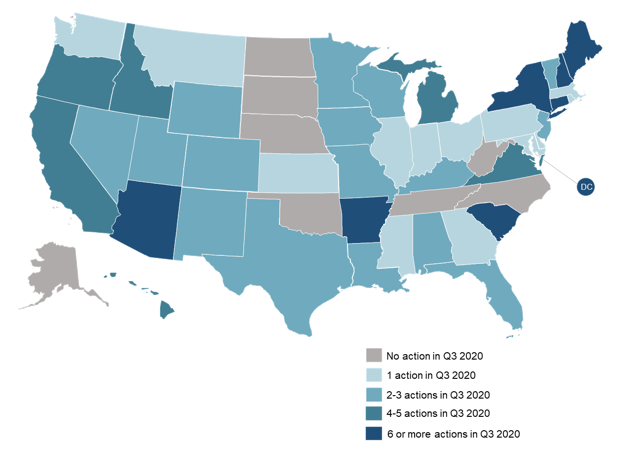The 50 States of Solar: States Continue to Evolve Net Metering Policies During Q3 2020
The N.C. Clean Energy Technology Center (NCCETC) released its Q3 2020 edition of The 50 States of Solar. The quarterly series provides insights on state regulatory and legislative discussions and actions on distributed solar policy, with a focus on net metering, distributed solar valuation, community solar, residential fixed charges, residential demand and solar charges, third-party ownership, and utility-led rooftop solar programs.
The report finds that 42 states, plus the District of Columbia, took some type of distributed solar policy action during Q3 2020 (see figure below), with the greatest number of actions continuing to address net metering policies (58), community solar policies (35), and residential fixed charge or minimum bill increases (21). A total of 146 distributed solar policy actions were taken during Q3 2020, with the greatest number of actions taken in New York, New Hampshire, and Maine.
Q3 2020 Policy Action on Net Metering, Rate Design, and Solar Ownership

The report identifies three trends in solar policy activity taken in Q3 2020: (1) states exploring time-of-use rates for net metering customers, (2) state value of solar studies continuing to show widely varying results, and (3) COVID-19 impacting utility rate cases and regulator decisions.
"From South Carolina to California, we saw regulators and stakeholders take significant steps towards the continued evolution of net metering," noted Brian Lips, Senior Policy Project Manager at NCCETC.
The report notes the top five distributed solar policy actions of Q3 2020:
- Duke Energy and solar advocates reaching a net metering settlement in South Carolina;
- New York regulators approving a successor tariff for mass market projects;
- New Hampshire Commission Staff publishing a study of the locational value of distributed generation;
- The Net Metering 3.0 proceeding kicking off in California; and
- Ameren, solar advocates, and regulators clashing over net metering in Illinois.
"We continue to see states working to develop net metering successor tariffs, with more granular compensation structures receiving the most attention," said Autumn Proudlove, lead author of the report and Senior Policy Program Director at NCCETC. "Value of solar studies are also becoming more detailed, as states study the locational value of solar and the value of solar paired with storage."
N.C. Clean Energy Technology Center | http://www.nccleantech.ncsu.edu.











.png?r=4759)
